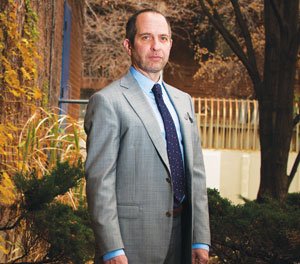In a case that raises significant issues for defence counsel around their visits to clients in custody, many Toronto lawyers are applauding an Ontario Court of Appeal ruling that set aside a drug-smuggling conviction against a colleague.

On Nov. 13, the appeal court ordered a new trial for veteran Toronto defence lawyer Deryk Gravesande after he challenged his conviction for smuggling 58 grams of marijuana to a client he was visiting at the now-defunct Don Jail in 2012.
Henein Hutchison LLP’s Scott Hutchison, who handled the appeal of Gravesande’s conviction, says there were several reasons for taking on the case. “One, he’s well loved in the legal community and the prosecution had really tested his resources, and, secondly, the circumstances of the case engaged issues that the whole profession is concerned about and that’s the relationship between counsel visiting their clients in institutions and the way they’re exposed when that happens,” he says.
“It highlights the importance of the procedures that institutions have in place and the need for them to be followed scrupulously and the danger of jumping to conclusions when those procedures haven’t been followed, which is what clearly happened here.”
To support Gravesande through the process, the Criminal Lawyers’ Association also created a fund that his peers donated to. Association president Anthony Moustacalis, who sat through most of the trial and appeal, says it wasn’t a surprise to see the conviction overturned based on what he saw as flawed testimony and errors in accepting it.
“It’s unsatisfactory that these types of mistakes can happen,” he says.
“The implications it has for lawyers going to these institutions are fairly serious. No matter how rare it may be, it can be very devastating to find yourself alone with somebody who has a reason to bring contraband into prison and they blame you.”
Moustacalis says it’s an issue that’s forcing many lawyers to shy away from conducting face-to-face meetings with clients in custody and “do it through the glass” instead. But he notes doing so limits their ability to speak fully about important matters and share documentation and dehumanizes the client.
Ontario Court Justice Wayne Rabley found Gravesande guilty of the charge in February after finding that the lawyer had handed his client eight cellophane-wrapped marijuana parcels and some rolled marijuana cigarettes while in prison. He received a two-year sentence as a result. During the case, two correctional officers testified Gravesande smelled strongly of cologne and marijuana as he approached the visiting room to meet with his client and noted they had orders to strip search the prisoner before and after the lawyer’s visit.
Written rules stipulate that the prisoner must undress completely and bend over while a second employee witnesses the search with the information recorded in a logbook. But one of the officers testified he had asked the prisoner to strip down only to his boxers and noticed no drugs during the first search. Another officer was only present for part of that search and it wasn’t noted in the logbook.
Once Gravesande’s meeting was over, officers discovered a black sock containing the marijuana, plus a parcel of lidocaine (an anesthetic) tied to the waistband of his boxers, during a second search of the prisoner. Although Rabley found the correctional officers hadn’t followed proper strip-search procedures before the client saw Gravesande, the judge nevertheless said there was enough circumstantial evidence to convict the lawyer.
The appeal court ruled that the trial judge had applied uneven scrutiny to the evidence and had given too much weight to the testimony about the odour. The appeal court also ruled that the trial judge had erred by not allowing a third-party record application by the defence seeking information on drug activity at the facility. Hutchison says it was an application the court should have allowed in order to shed light on the problem of drugs reaching prisoners.
“In circumstances like this, a reasonably tailored request for records related to how drugs get into an institution like this is an application the court should normally allow because it provides the essential background to understanding whatever value there is to the inferences the Crown wants to see drawn,” he says.
“The trial judge wouldn’t even go past the first stage of the
O’Connor test and find that the documents were likely relevant and the Court of Appeal has said quite clearly that those documents were likely relevant,” he adds, citing
R. v. O’Connor.
Lawyer Jonathan Rosenthal, who sat in support of Gravesande during the bulk of the proceedings, calls his colleague’s conviction “a miscarriage of justice” and says the ruling is a stern warning to institutions to follow procedure. He says lawyers must be mindful during their visits of the fact that institutions may not always follow their procedures to the letter.
“The lesson is jail guards have to do their job properly. These procedures are in place to make sure these miscarriages of justice, like this one against Mr. Gravesande, don’t happen,” he says.
Although the Crown didn’t respond to comment by press time, Hutchison suggests a new trial is unlikely.
“It’s certainly a case where the Crown should have a hard look before it moves forward. It’s fair to say what the Court of the Appeal is saying is that there was reasonable doubt on this record and if you take that view of it, it wouldn’t really be appropriate to push forward.”

 On Nov. 13, the appeal court ordered a new trial for veteran Toronto defence lawyer Deryk Gravesande after he challenged his conviction for smuggling 58 grams of marijuana to a client he was visiting at the now-defunct Don Jail in 2012.
On Nov. 13, the appeal court ordered a new trial for veteran Toronto defence lawyer Deryk Gravesande after he challenged his conviction for smuggling 58 grams of marijuana to a client he was visiting at the now-defunct Don Jail in 2012.